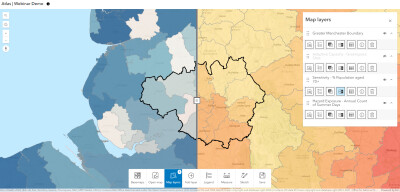To accelerate efforts to combat the $140 billion in economic losses due to extreme weather brought on by climate change, NVIDIA today announced its Earth-2 climate digital twin cloud platform for simulating and visualizing weather and climate at unprecedented scale.
Part of the NVIDIA CUDA-X™ microservices, announced separately today, Earth-2’s new cloud APIs on NVIDIA DGX Cloud™ allow virtually any user to create AI-powered emulations to speed delivery of interactive, high-resolution simulations ranging from the global atmosphere and local cloud cover to typhoons and turbulence.
When combined with proprietary data owned by companies in the $20 billion climate tech industry, the Earth-2 application programming interfaces help users deliver warnings and updated forecasts in seconds compared to the minutes or hours in traditional CPU-driven modeling.
“Climate disasters are now normal — historic droughts, catastrophic hurricanes and generational floods appear in the news with alarming frequency,” said Jensen Huang, founder and CEO of NVIDIA. “Earth-2 cloud APIs strive to help us better prepare for — and inspire us to act to moderate — extreme weather.”
Groundbreaking Generative AI for Climate Tech
Earth-2’s APIs offer AI models and employ a new NVIDIA generative AI model called CorrDiff, using state-of-the-art diffusion modeling, that generates 12.5x higher resolution images than current numerical models 1,000x faster and 3,000x more energy efficiently. It corrects inaccuracies of coarse-resolution forecasts and synthesizes metrics critical to decision-making. CorrDiff is a first-of-its-kind generative AI model to deliver super-resolution, synthesize new metrics of interest to stakeholders, and learn the physics of fine-scale local weather from high-resolution datasets.
The Central Weather Administration of Taiwan plans to use these diffusion models to forecast more precise locations of typhoon landfall. When a typhoon warning is launched, the priority is to minimize casualties by carrying out early evacuations based on quality information generated by relevant agencies, including Taiwan’s National Science and Technology Center for Disaster Reduction (NCDR). In the last decade, the death toll due to typhoons has fallen.
“Taiwan is a critical component of the global supply chain, and flooding risk analysis and evacuation preparedness are core to our mandate,” said Chia-Ping Cheng, administrator of CWA.
With more than 136 typhoons striking the island since 2000, using Earth-2 to mitigate these impacts is key to improving the quality and resolution of disaster informatics, NCDR said.
Another key component of Earth-2 cloud APIs is NVIDIA Omniverse™, a computing platform that enables individuals and teams to develop Universal Scene Description (OpenUSD)-based 3D workflows and applications.
The Weather Company, a global leader in weather data forecasting and insights, plans to integrate its meteorological data and Weatherverse tools with Omniverse, enabling customers building digital twins to better understand and visualize the impact of actual weather conditions for the first time. The Weather Company also plans to explore the use of NVIDIA score-based generative AI for its Weatherverse services, Weather Engine solution for enterprise-level weather intelligence and new high-resolution weather modeling products.
“To help effectively address current and future weather- and climate-related challenges, it’s critical now more than ever to incorporate reliable, globally scaled real weather data and insights into digital twin environments to better analyze, plan and simulate the impacts of weather,” said Sheri Bachstein, CEO of The Weather Company. “We’ve worked with NVIDIA for years on GPU acceleration of GRAF, our proprietary weather modeling systems, and we plan to adopt Earth-2 APIs to create higher resolution, energy-efficient simulations at a lower cost.”
Other early adopters of Earth-2 APIs include weather analytics platform companies like Spire and Meteomatics, which can build on their proprietary data sources and data assimilation to produce accurate forecasts, as well as startups Tomorrow.io, north.io and ClimaSens, which are exploring new solutions for climate tech applications.
NVIDIA DGX Cloud-Powered Compute
Earth-2 APIs use DGX Cloud to provide full-stack acceleration for climate and weather solutions. This includes optimal AI pipelines for models such as FourCastNet, GraphCast and Deep Learning Weather Prediction. It also includes GPU acceleration of numerical weather prediction models like ICON on the latest NVIDIA Grace Hopper™ systems. Running on NVIDIA DGX GH200, HGX™ H100 and OVX™ supercomputers, Earth-2 may provide a path to simulate and visualize the global climate simulations at unprecedented speed and scale.
Source: NVIDIA






